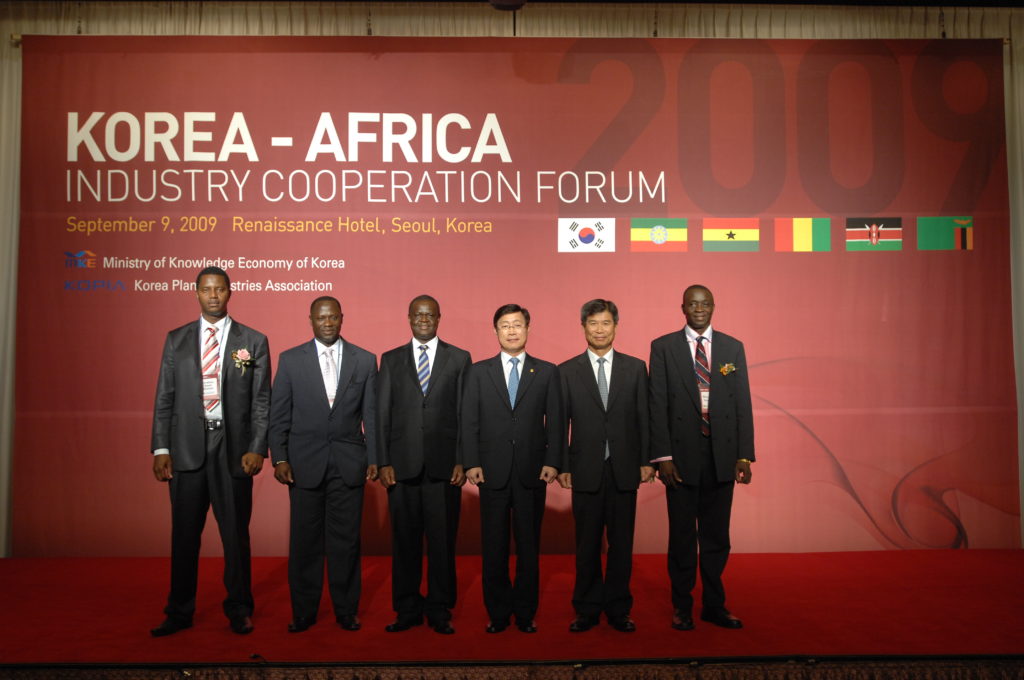The Peninsula
The Korean Approach in Africa: Unique or Ordinary?

By Sarah K. Yun
Although Korea established diplomatic relations with many African countries in the early 1960s, it was not until recently that these relations were aggressively nurtured. In the last decade or so, South Korea has actively worked to enhance relations with Africa, seeing the continent as a “fresh engine” for Korea’s growth. During this process, Korea has successfully positioned itself as a mutually beneficial partner to Africa in knowledge sharing such as transferring agricultural technology, human resources training, and helping with national development strategies. Korea also offers an alternative source of development assistance from China. Korea, on the other hand, has found lucrative investments in Africa’s natural resources, especially as it seeks to lower its dependency on oil from the Middle East. Moreover, engagements with Africa serve as an opportunity for Korea to elevate its status as a leader in the international community. All in all, the two have identified each other’s interests and economies as complementary.
Both sides have established institutions and structures to build trust and sustained interaction. A symbol of commitment between Korea and Africa is the Korea-Africa Forum, started in 2006 by Ban Ki-moon, then ROK Minister of Foreign Affairs and Trade. Four years later, Korean and African officials gathered in Seoul for the bi-annual Korea-Africa Economic Cooperation Conference (KOAFEC). At previous KOAFEC meetings, various initiatives were launched to strengthen Korea-Africa relations, such as the announcement for Korea to double its development cooperation fund aimed at infrastructure expansion from $590 million in 2005-2009 to $1.09 billion for 2010-2014. At the previous Korea-Africa Forum in 2009, both sides agreed to cooperate on global challenges such as reduction of greenhouse gas emissions, share development experiences of capacity building and promoting governance, and affirmed Korea’s commitment to double its ODA to Africa by 2012 compared to 2008, among others.
While the Korea-Africa partnership has grown, the international community has undergone many new challenges. Given the new circumstances since 2006, what issues should be addressed at the next Korea Africa Forum in 2012? First, the discussion should entail Korea’s role in the protection of Africa against the euro and global financial crisis. Second, Korea should enact a comprehensive ODA strategy including the balancing of grant and loans, both of which must ultimately lead to poverty reduction and sustainable development of local enterprises in Africa. Third, Korea should explore ways to mitigate risks and uncertainties of African markets by providing incentives to Korean companies to invest in Africa. This will foster a more stable business environment by instilling institutions and Korean approaches. Fourth, there should be a renewed emphasis on education. Not only is knowledge sharing important but also providing various educational opportunities to the emerging African leaders will be key in paving the way for a Korean approach that mutually benefits both Korea and Africa.
Relative to many other developed countries, Korea’s activities in Africa have not been as negatively impacted by the recent financial crisis. In addition, China’s activities in the African economy have often been criticized. At the same time, the U.S. is struggling through its own domestic job crisis, while Europe is plagued with its grim economic state and faced with a unique history as the former colonizers of Africa. This reality, combined with Korea’s unprecedented development path, sets the stage for Korea to play a unique role in Africa. The key for Korea will be to focus ultimately on mutual benefit via Africa’s sustainable development in order to avoid what some call the pitfalls of China’s negative reputation in Africa.
Sarah K. Yun is the Director of Public Affairs and Regional Issues for the Korea Economic Institute. The views expressed here are her own.
